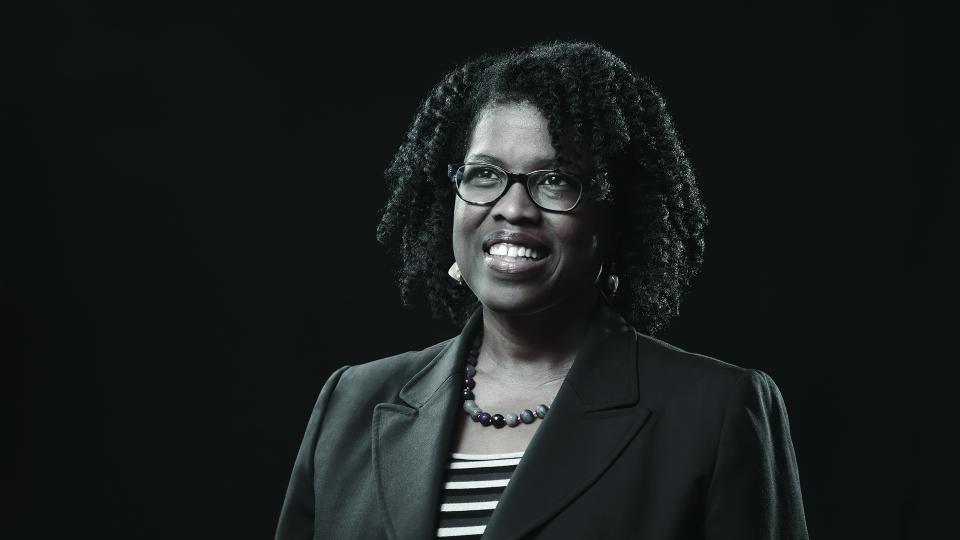by Adam Grybowski
Associate Professor of Accounting Evelyn McDowell says she was made to be an accountant.
McDowell grew up in Cleveland, the second oldest of eight kids. From a young age, she was drawn to counting money, and unlike many young girls, she preferred to play with cash registers and ledger books over dolls. No one in her family ever talked about accounting, but when McDowell took an accounting class in high school, she knew she had found her passion and her future profession.
Despite her drive, McDowell believes she would never have been able to become an accountant if not for Inroads, a nonprofit she joined in high school that aims to increase ethnic diversity in corporations through training and paid internships. The program helped her earn a bachelor’s in business administration from Baldwin-Wallace College. McDowell later added a master’s in accounting and a doctorate in philosophy from Case Western Reserve University.
As she continued her education, McDowell worked for the Federal Reserve, the U.S. Department of Housing and Urban Development, the City of Cleveland, and other governmental and nonprofit organizations. Meanwhile, she operated a private accounting practice on the side. Eventually, she operated her practice full-time for over 10 years.
In 2005, as she was finishing her doctorate, McDowell moved from Cleveland to New Jersey to begin teaching at Rider. Her classes include accounting theory, governmental accounting, principles of accounting and managerial accounting. In 2011, McDowell, along with Executive Advisory Committee member and retired Ernst & Young partner Allen Boston, created the Aspiring Accounting Professional Program at Rider University, which combines tutoring and practical experience through an informal professional mentorship specifically to help underrepresented groups in the accounting field. The program is sustained through a reoccurring grant from the Nellie Mae Education Foundation.
Recently, McDowell became president of National Society Sons & Daughters of the United States Middle Passage, a lineage society dedicated to preserving the memory and history of the artifacts and landmarks of slavery. The group held its first-ever conference and awards banquet, at Rider, on May 20.
Q&A
Is there a moral dimension to accounting?
Accountants have a lot of power. Often the only way to get funds is to demonstrate that you can return capital, and you do that with accounting information. Accountants stand between companies who need capital and entities and individuals who have capital. We are often pressured to bend the rules to make the numbers appear better than they are. Even though the rules are becoming more subjective, many remain pretty black and white. Jokingly, I tell my students, if you don’t follow them, you go to jail. It is my way of reminding them that accounting matters.
What do you like most about teaching at Rider?
The students who are here are often first- or second-generation students. They come in needing a little bit of fine-tuning, and then they blossom right in front of you. I love to see that. They come eager to learn, and when they start to figure out that there’s more to life than what they’ve known, I’ve seen many of them become very driven.
Does the field of accounting have a diversity problem?
Diversity in accounting is horrible. Only one percent of partners are African American, and it’s been that way for years and years, and it doesn’t grow. It’s not about accounting; it’s simply a disadvantaged situation that brown people find themselves in. It’s an accident of birth. Who your parents are and where you’re born makes a huge difference in our country. To solve the problem, we must resolve inequality, poverty and racism.
How does Rider’s Aspiring Accounting Professional Program help address diversity in accounting?
This organization is designed to identify those groups who need a boost and create a community of mentors and students. Many of the mentors come from Rider’s Accounting Advisory Board or are alumni. Students go out to firms and work with their mentors, which helps them link what they’re learning in class to real-world experience. We have had about 80 students come through the programs. What we’re doing isn’t even a drop in the bucket, but it is helping a few people get into the pipeline.
What’s a popular misconception about accounting?
You don’t need a math aptitude to become an accountant. In terms of math, 8th-grade algebra is all you need. I get students all the time who were told to be accountants because they’re good at math, even though it’s not something they necessarily would have chosen for themselves. The students who really do the best are the ones who fall in love with accounting, especially in high school. That’s what happened to me.
You’re currently embarking on a new research project that examines how governments accounted for slavery through the recording of taxes. What made you choose this topic?
To begin with, we know very little about it. The more we know about what happened to enslaved people, the more we can move on. Our country has to have a truth and reconciliation. My great-grandmother was born into slavery. We’re often embarrassed to tell these kinds of stories, as if we’re ashamed our family members allowed themselves to become enslaved. But, through my research, I found it took great violence and intimidation to maintain slavery. At one point, the entire country conspired to keep them in bondage. But when you see what they went through, and focus on the individuals, you realize how incredibly strong and resilient they were. You see how much the entire country owes its economic success to the institution of slavery.

